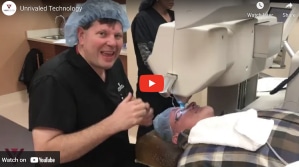Cataract
Cataracts are the leading cause of blindness around the world. They can cause various symptoms, and each patient’s experience with cataracts is unique. For this reason, patients can have different goals regarding their cataract treatment. While some prioritize being able to drive at night, others are more concerned with completely getting out of glasses and contacts.
At Vold Vision, we can customize your cataract experience with lenses that fit your specific needs. We offer the most revolutionary technology on the market today, and our patients are achieving a vision they did not think was possible at this stage in life.
Discover our patient success stories.
*Individual results may vary.
What is a Cataract?
A cataract is the stiffening of our eye’s natural lens, which leads to blurry vision and clouding. Having a cataract is like having a dirty windshield on your car. They typically strike people over age 40 and affect over 24.4 million Americans. While they are painless, they cause poor night vision, distracting glares, and reduced color perception.
In the early stages, cataracts begin very small and are almost undetectable. However, the condition is progressive, and with time vision will start to blur more and more.
There are three primary types of cataracts:
- Subcapsular cataract
- Nuclear cataract
- Cortical cataract
The signs and symptoms can vary widely depending on what type of cataract you have. Regardless of symptomatology, the moment a cataract is suspected, it is important to see a trained eye doctor for a correct diagnosis. The eye surgeons at Vold Vision treat every type of cataract, and they each require a unique treatment plan and ongoing management.
How Does Cataract Treatment Work?
While the number of cataract cases is significant and widespread, there are treatments available depending on the type and progression of your specific case. During your initial consultation, your eyes will be examined, and your physician may or may not recommend surgery to remove cataracts.
If surgery is recommended, one of the physicians at Vold Vision will remove your clouded lens and replace it with a new, clear, intraocular lens (IOL). New IOLs are continually being developed to make them more useful for you. During your initial in-office exam, our optical technician will perform eye measurements to allow us to place the perfect customized lens during surgery.
There are two primary types of cataract surgery:
There are a number of other cataract treatments available for patients who may not need traditional or laser cataract surgery. At Vold Vision, our surgeons sit with each patient one-on-one to create a tailored, custom treatment approach.
What are the Benefits of Cataract Surgery?
The benefits of your cataract treatment will depend on your specific surgical goals and the intraocular lens that you choose. IOLs can address a variety of vision concerns, allowing patients to choose their priorities and customize their visual outcomes. At Vold Vision, we offer the following IOLs:
Panoptix Lens
See Clearly at Near, Intermediate, and Distance
The revolutionary PanOptix lens offers patients a full range of vision to enhance their active lifestyle. PanOptix is the first and only trifocal lens available in the United States and has been an absolute game-changer for patients who are ready to be free of glasses and contacts.

Vivity Lens
See Clearly at a Distance + Functional Near & Intermediate
The AcrySof® IQ Vivity™ Lens shines a light on what’s important in your everyday life. This first-of-its-kind lens allows patients to see clearly at the crucial far and intermediate distances while still providing functional near vision in bright and dim lighting. An overwhelming number of Vivity™ Lens patients reported no longer being bothered by glare, halos, and starbursts.
Light Adjustable Lens
See Clearly at a Distance with Customized Vision
The RxSight® Light Adjustable Lens (LAL) gives the patient complete control of their final visual outcome. As the first truly customizable lens, the LAL uses an ultraviolet (UV) light source that allows the patient and their doctor to dial in their perfect distance vision after cataract surgery. This gives the patient the potential to see even better than 20/20 at a distance. Patients also enjoy a greater depth of focus with the LAL, as well as improved clarity.
*You will still need glasses for intermediate and near activities.

Distance
Enjoy Seeing Clearly at a Distance!
Utilizing the industry-leading Wavefront Monofocal Lens, the Distance option offers patients the freedom to enjoy life with minimal to no need for glasses or contacts to see far away. With their new distance vision, patients can see road signs, appreciate nature, watch television, or take in a sporting event in a new life-changing way.
*You will still need glasses for intermediate and near activities.

Distance Plus
Say Goodbye to Your Astigmatism & Hello to Distance Vision!
The Distance Plus option offers patients with astigmatism the opportunity to see far away with minimal to no need for distance glasses or contacts. With our toric intraocular lens, patients who have suffered from the difficulty of astigmatism can now experience visual freedom they never thought possible.
*You will still need glasses for intermediate and near activities.
How Long is the Recovery after Cataract Treatment?
Many people are delighted to report that they can see much more clearly within a few hours of surgery, and almost all report being able to do so within a day or two. Most people require one to two days of recovery before resuming their normal daily activities. After surgery, Dr. Vold will talk with you about any medications he may prescribe, instructions on how to take care of your eyes, and arrange a follow-up appointment.
While healing after surgery, you should avoid bending, rubbing, or putting pressure on your eyes. You will also be unable to drive for 24 hours after surgery, so be sure to have a friend or family member help you with transportation.
Who is a Candidate for Cataract Surgery?
Almost anyone suffering from cataracts, even moderately, is a good candidate for corrective surgery of one type or another. However, a patient’s vision must be 20/40 or worse before qualifying for surgery. Candidacy is also determined by how much cataracts interfere with the patient’s everyday activities.
An experienced optical technician at Vold Vision will carefully assess your eyes using the most advanced equipment to determine your eligibility for surgery.
With state-of-the-art lenses, we can even treat nearsightedness, farsightedness, and astigmatism with cataract surgery.
When a patient loses their ability to read, drive or carry out other everyday activities, we encourage patients to undergo an ophthalmic evaluation. With the incredible safety and efficacy of lens extraction, patients now are electing to proceed with cataract surgery much earlier than in the past.
Learn More About Cataracts
Why Should I Go to Vold Vision for Cataract Treatment?
Cataract innovation is a passion for award-winning cataract surgeon Dr. Steven Vold. Dr. Vold is a true innovator in ophthalmology, offering the most advanced cataract surgery available, and taking special care in customizing treatment for each patient. Dr. Vold was the first in Arkansas to perform custom laser cataract correction.
Cataract FAQ
Take the Next Step
To learn more about cataracts, schedule a consultation with one of the providers at Vold Vision. Throughout your entire treatment journey, you will have your very own Vold liaison to assist you with any questions you have. Our patient care counselors are available by text, phone, or email and no question is too small for them to answer. To schedule a consultation, fill out the consultation request form below, or call or text (479) 442-8653.








